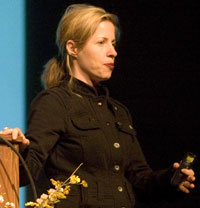Internet for social change

Andrew Riggs / The Collegian
Tiffany Shlain, "Good Morning America's" Internet expert and commentator on media, design and Internet culture, came to Fresno on Thursday. |
By Megan Bakker
The Collegian
MySpace and Google were some of the topics Tiffany Shlain touched on Thursday night during a presentation called “Using the Web to Shape Social Change.”
For her, the most exciting thing about the Internet is its sense of community.
“The web is this organic living organism,” she said. One third of all web content today is “created for free by people who just want to contribute,” Shlain said.
Along with people contributing online, MySpace came up as an example of a new trend called “Social Networking.” The idea is similar to six degrees of separation. With social networking, Shlain said, individuals can search the people they know, and find out who they know, know, and build up an ever-increasing network of friends and contacts.
“Geographical barriers no longer matter,” Shlain said.
She also brought up the Red Cross, which used the Internet during the Hurricane Katrina aftermath to solicit donations and volunteers. The Red Cross broadened its reach through the web.
Google, and how it’s changing the way people process information was another topic. With Google, people are moving away from memorizing everything they need to know. Now, Shlain said, students expect to have information within one or two search words.
“Maybe now that we’re to trying to hold onto so much data … we’ll start thinking in a different way,” Shlain said. She added that multiple browser windows and hyperlinks within stories allow a more stream-of-consciousness work environment.
“We’re very non-linear thinkers.”
Shlain said the web is much more exciting today than when it began.
“When more people get on a network, the stronger that network becomes,” Shlain said.
Comment on this story in the News forum >>
|
